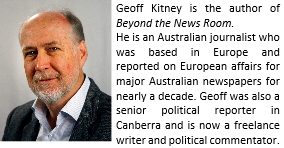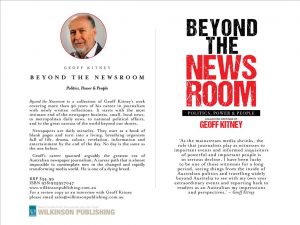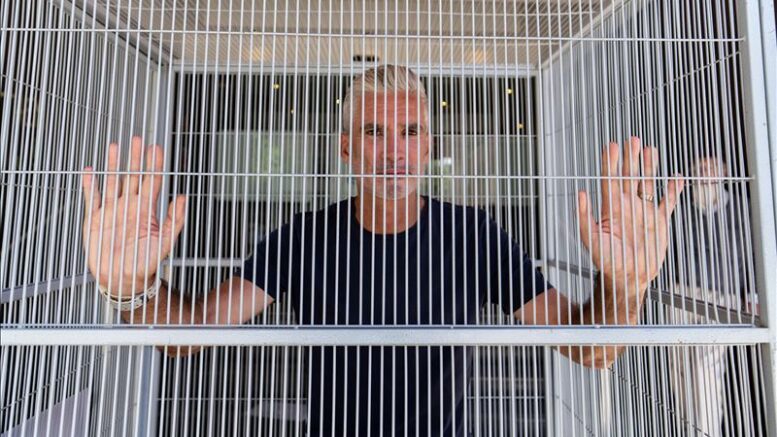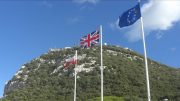The BBC may have reinstated sports pundit Gary Lineker, but the debate on the United Kingdom government’s tough new refugee policy will go on and on, writes Geoff Kitney.
In today’s democracies, what are the limits of free speech? At what point should an individual’s right to say what they think about political issues of the day be curtailed? Should there be limits to this freedom, imposed to protect the interests of governments or corporations?
These questions, now being asked in a heated environment in the United Kingdom, have echoes in Australia going back two decades.
The UK’s controversial, newly announced border protection policies – under the slogan Stop the Boats – are based on an Australian blueprint.
Key advisers involved in drawing up the UK policy were also the architects of the Australian policy, first adopted in 2001. Its aim? To stop asylum seekers arriving on Australian soil. The slogan – Stop the Boats – is a direct take from the Australian model. The clarion commitment by UK Prime Minister Rishi Sunak to “decide who comes into this country and on what terms” was promised in exactly the same words as then Australian conservative Prime Minister John Howard in his election campaign launch in 2001.
Throughout the more than 20 years of controversy in Australia about these policies there have been strong debates about the basis on which this debate should take place.
This has fed into a wider debate about freedom of speech and what its limitations should be, if any.
In the sports arena, there was a famous debate a few years ago when then star Australian rugby union player Israel Folau had his contract with the Australian Rugby Union cancelled after he posted strong social media comments. A practising Christian Falau wrote that “hell awaits drunks, homosexuals, adulterers, liars, fornicators, thieves, atheists and idolators”.
At the time, right wing and conservative commentators protested loudly in support of Folau, arguing that the ARU had breached his right to free speech.
More specifically, there has been ongoing controversy about what was “allowable” in the debate over border protection. Subsequent conservative governments to the Howard government drew a heavy veil of secrecy over operations to stop and turn around boats carrying people seeking asylum, making it illegal to disclose details of “on water matters” relating to Border Force operations to prevent small boats entering Australian waters.
Interestingly, one of the loudest Australian critics of the government’s harsh border protection regime and its treatment of those seeking to come to Australia on small boats is a footballer – former Australian Socceroos player and captain Craig Foster.
‘Human rights, which are independent of any party, politician or government of the day, provide us with the only true neutrality. Criticising policy that manifests these dangers is a duty we all hold. Otherwise, when does our profession start and our humanity end?’
Craig Foster, Sydney Morning Herald
He is both a high-profile football commentator for Australia’s second public broadcaster, the Special Broadcasting Service, and an outspoken advocate for the rights of refugees and asylum seekers.
Foster (who in the 1990s played several seasons in England for Portsmouth and Crystal Palace) has never hesitated to enter the political controversy over Australia’s treatment of refugees – and has quickly entered the controversy over Gary Lineker’s remarks about the UK government’s Stop the Boats policies.
Foster defended Lineker’s right to say what he said and argued that it was not inappropriate for him to do so because the UK government’s policy had the clear intention of “stoking division and hate”.
“There is a fundamental difference between calling out human rights abuse and being politically partisan,” Foster said.
“There is no such thing as taking a “neutral” approach to racism, the marginalization of groups, hate speech, violence and a descent into treating people like animals,” Foster wrote in today’s Sydney Morning Herald.
“Human rights, which are independent of any party, politician or government of the day, provide us with the only true neutrality. Criticising policy that manifests these dangers is a duty we all hold. Otherwise, when does our profession start and our humanity end?”
Foster said that Australians should be “deeply ashamed” that the policy of Australian governments – which has cost billions of dollars to implement and destroyed many lives – was now “travelling the world and taking our reputation with it”.
“The Sunak government has copied Australia’s policy right down to the simplistic, diversionary slogan Stop the Boats.”
Those three words have defined much that has happened in Australian politics for most of the first quarter of the 21st century.
From that day in September 2001 when then conservative Prime Minister John Howard ordered gun-toting Special Air Service regiment troops to force a ship (the Norwegian-owned MV Tampa) carrying hundreds of rescued asylum seekers to turn around to stop it entering Australian territorial waters, Australia has put in place a raft of laws designed to deter asylum seekers from coming to Australia by small boat and a punishing regime of penalties for those who do.
There are still offshore detention centres on nearby Pacific Islands containing some of those who made the mistake of thinking it was still worth taking the risk of boarding a small boat and undergoing treacherous ocean voyages to reach Australia and seek refugee protection. Some of those detainees have been held for 10 years in conditions condemned by the United Nations and human rights organisations.
But here’s the thing: it worked!
The boats stopped.
The hard-line policy worked so effectively that subsequent Labor governments have not dared to reverse it, with public opinion consistently in favour of the policy.
One of John Howard’s successors as Prime Minister, Tony Abbott, has named stopping the boats as the greatest modern achievement of conservative governments.
But Foster argues that casting the border security policy as “stopping the boats” rather than shutting out desperate humans had been successful only in “numbing the Australian public to the reality of human mobility and suffering”.
A thought provoking thread that’s worth a couple of minutes of your time: https://t.co/NckBd2wEIe
— Gary Lineker 💙💛 (@GaryLineker) March 8, 2023
“To ensure that ordinary Australians would turn a blind eye to suffering and death it is fundamentally necessary to portray a group as unworthy, improper, criminal and dangerous. Thus, the act of entering another country when seeking safety must be called illegal. Immigration becomes border security.”
To this day, and in light of the application of national security laws to forbid publication of the details of implementing Australia’s Stop the Boats policy, it is still not known how many boats have attempted to enter Australian waters and what plight the people on those boats met.
Removing the issue from public view has meant that boat arrivals is no longer a top issue of political debate.
That people who made it to Australia before the boats stopped are still in detention many years later raises little public concern – even though most of those in detention have been found to have genuine claims to asylum.
There is little doubt that the success of Australia’s Stop the Boats policies has been a significant influence on Sunak and his ministers and the hard-line measures they have announced to try to end small boat arrivals from across the English Channel.
Like Australian conservative governments over the years, Sunak has accepted advice – including from former Australian politicians – that doing whatever it takes to stop the boats is good politics.
But there are different circumstances which may make the outcome for Sunak and the conservatives very different to the outcome in Australia.
The English Channel is a much narrower crossing than from Indonesia to Australia, which involves a journey through some of the roughest seas on the planet.
It will almost certainly be easier for “illegal” arrivals to spirit themselves away in crowded England than in sparsely populated Australia.
And Australia ran no risk of having its harsh border protection rules running the gauntlet of the European Convention on Human Rights, which might lead to the new laws being ruled illegal.
One thing is for sure, though. There will continue to be a group of influential Australians working behind the scenes in the UK to ensure that the policies they have inspired the UK government to adopt will deliver the same political dividends for the British Conservative government that they did for Australian conservative governments.
Headline image credit: Matt Hrkac/Flickr Licensed under Creative Commons Attribution 4.0 International (CC BY 4.0)






